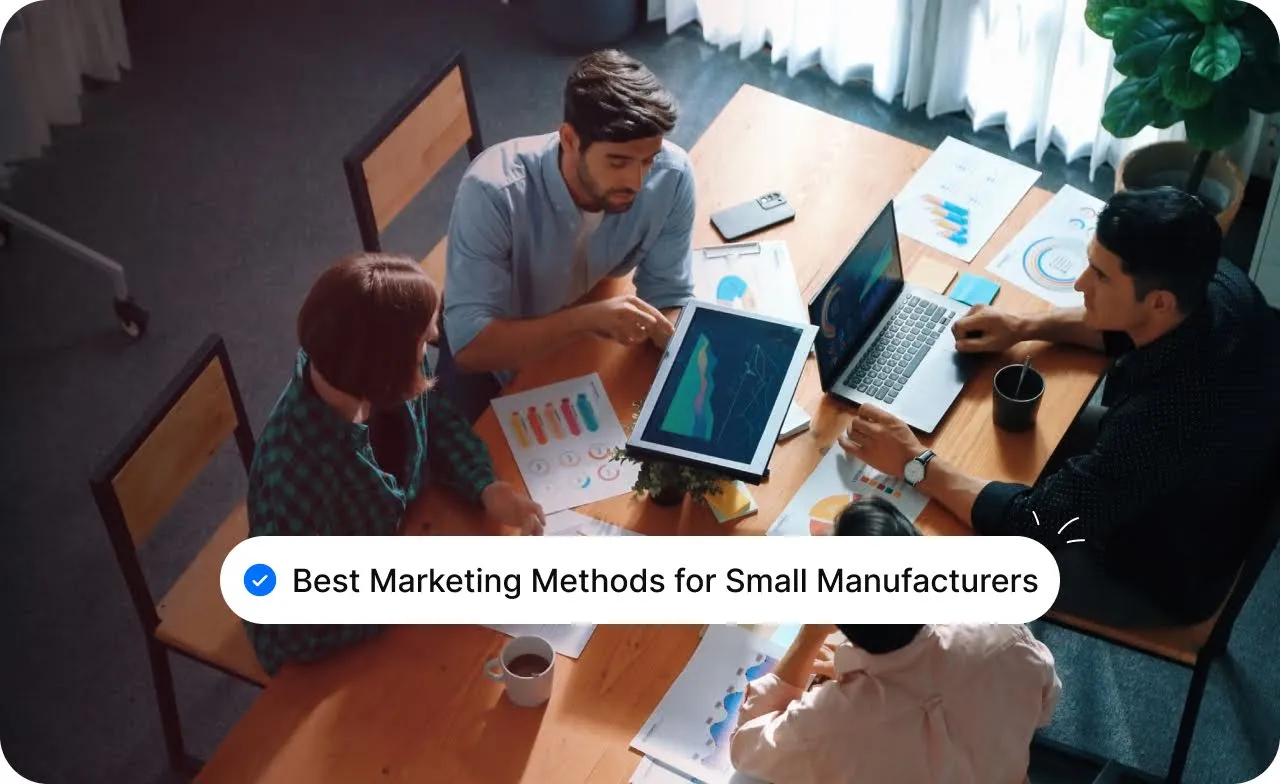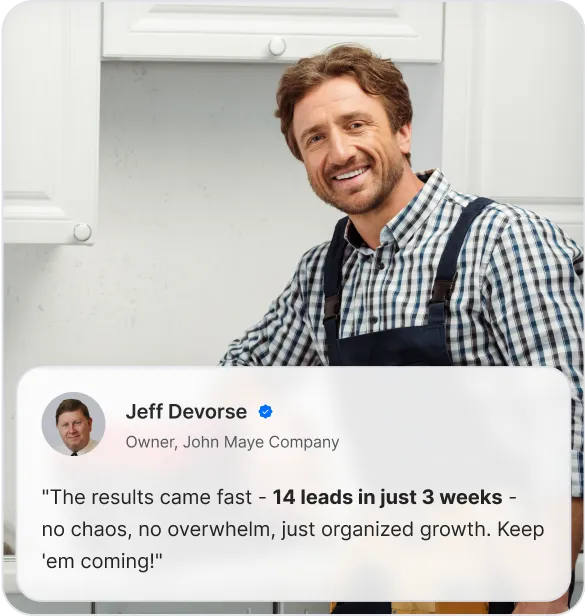Small manufacturers live in a strange middle ground. You are not a startup. You are not a massive enterprise either. You run lean, stay hands-on, and juggle production, sales, and operations all at once. Marketing often ends up being the thing you get to only when everything else is done. And when you do touch it, it feels confusing, inconsistent, or impossible to measure.
Here is the part most small manufacturers overlook. You need more innovative methods that fit how your business actually runs. Simple systems. Clear positioning. Consistent visibility in the right places.
This blog breaks down 11 proven marketing strategies that help small manufacturers attract better leads, stay relevant, and create steady growth without burning time or budget.
The Starting Point for Smarter Manufacturer Marketing
Most marketing efforts fail for small manufacturers for one simple reason. The foundation is shaky. New tactics are added on top of unclear messaging, outdated websites, or inconsistent positioning. No strategy works well when the basics are misaligned.
Before you move into specific methods, make sure these core elements are solid:
- Your value is clearly defined
Can a buyer understand what makes you different in under 10 seconds? If not, no strategy will convert well.
- Your ideal buyer is specific
“Anyone who needs manufacturing” is not a target. Narrow focus makes every marketing move sharper.
- Your website explains, not just shows
A gallery of machinery is not enough. Buyers want context, process clarity, and real outcomes.
- Your contact path is friction-free
If it takes effort to request a quote or speak to someone, interest fades fast.
- Your messaging stays consistent
What you say on your website, emails, and sales material should reinforce the same story.
By implementing the right strategies and continually refining your approach, you can unlock meaningful growth.
11 Core Marketing Strategies for Small Manufacturers
Effective marketing for small manufacturers starts with clarity, consistency, and smart channel selection. From understanding who you are selling to and strengthening your online visibility, to building authority through content and nurturing long-term relationships, each strategy plays a role in creating steady demand:
1. Know Who You’re Selling To
Knowing your target market is the key to making your marketing efforts effective and efficient. If you're marketing to the wrong audience, even the best strategies will fall flat.
Actionable Steps:
- Conduct Research: Understanding who your ideal customer is should be the first step in any marketing campaign. Whether you are targeting wholesalers, retailers, or direct consumers, the approach will differ. Use market research tools like surveys, interviews, and analytics to gather insights about your audience's needs.
- Create Buyer Personas: Develop detailed profiles for your target customers—this includes their demographics, pain points, goals, and purchasing behaviors. By understanding these elements, you can create targeted messages that address their unique needs.
- Tailor Your Messaging: Once you've defined your audience, customize your messaging to speak directly to them. Use language that resonates with their specific pain points and highlight how your products provide solutions.
2. Get Found Online
Search Engine Optimization (SEO) is crucial for manufacturers aiming to boost their online visibility. With the right strategy, SEO doesn’t have to be complicated or costly.

Actionable Steps:
- Optimize Your Website: Ensure your website uses the right keywords for your products and services. Tools like Google Keyword Planner can help you identify high-traffic terms that are specific to your industry.
- Focus on Local SEO: For small manufacturers, targeting local customers can be a game changer. Optimize for local searches by including location-based keywords and claiming your Google My Business listing.
- Use Google My Business: It's a free tool that helps improve local SEO. Set up your business profile, encourage reviews, and share updates to improve visibility in local searches.
3. Build Authority with Content Marketing
Content marketing is one of the most effective ways for small manufacturers to connect with potential customers by offering valuable, informative content that builds trust over time.
Actionable Steps:
- Write Blogs, Guides, and How-Tos: Create educational content that helps your target audience solve problems related to your products. This could include step-by-step guides, industry insights, or product breakdowns.
- Use Case Studies: Show real-world examples of your products in action. Case studies highlight your products' benefits and help build authority by demonstrating their effectiveness.
- Create Videos and Infographics: Complex manufacturing processes or products can be hard to explain with words alone. Use video demos or infographics to showcase your products’ features and benefits in a visually engaging way.
4. Social Media
Social media can be a powerful tool to engage with potential customers and showcase your products. The trick is to use the right platforms and content to make an impact.

Actionable Steps:
- Focus on LinkedIn, YouTube, and Facebook: These platforms are great for B2B manufacturers. LinkedIn allows you to network and share thought leadership, while YouTube is perfect for product demos, and Facebook works for community-building.
- Share Value-Driven Content: Post content that educates and adds value, not just product promotions. Share insights into industry trends, problem-solving tips, or behind-the-scenes looks at your production process.
- Use Hashtags and Engage: Participate in relevant conversations using hashtags, join groups, and reply to comments to increase visibility and drive engagement.
5. Email Marketing
Email marketing is a highly cost-effective way to keep your brand in front of potential and existing customers. It’s an essential strategy for manufacturers who want to nurture long-term relationships.

Actionable Steps:
- Build and Segment Your Email List: Create segmented lists based on customer behavior, preferences, or demographics. This allows you to send targeted messages that are relevant to each group.
- Send Product Updates and Exclusive Offers: Keep your customers informed about new product releases, special discounts, and industry news. Make them feel valued with exclusive offers that encourage repeat purchases.
- Automate Your Campaigns: Set up automated email flows for customer onboarding, post-purchase follow-ups, or abandoned cart reminders. This saves you time while keeping customers engaged.
6. PPC Ads
Pay-per-click (PPC) advertising is an excellent way for small manufacturers to drive targeted traffic quickly, especially in competitive markets where organic reach can take time.
Actionable Steps:
- Run Targeted PPC Campaigns: Use platforms like Google Ads to bid on industry-related keywords and target specific buyer segments. Set up retargeting ads to follow up with visitors who didn’t convert on their first visit.
- Monitor and Optimize: Track the performance of your campaigns and adjust bids and keywords to maximize ROI. Ensure that your landing pages are optimized for conversions to make the most of your ad spend.
7. Referral Programs
Referral programs are an easy and cost-effective way to acquire new customers by leveraging the trust your existing customers have in your products.
Actionable Steps:
- Encourage Referrals: Offer incentives like discounts or free products to customers who refer new business. Make the process as easy as possible, like creating unique referral links for easy sharing.
- Build a Referral Network: Collaborate with complementary businesses to create mutual referral programs. This expands your reach and brings in qualified leads that are more likely to convert.
- Track and Optimize: Monitor the success of your referral program and continuously optimize it based on performance. Look at which channels or referral partners are delivering the best results.
8. Trade Shows and Events
Trade shows and industry events are excellent opportunities for manufacturers to network, showcase products, and build relationships with potential customers and partners.
Actionable Steps:
- Attend Relevant Trade Shows: Focus on industry-specific events where you can meet your target audience. These events offer great networking opportunities and the chance to see what competitors are doing.
- Prepare Marketing Materials: Bring high-quality product demos, brochures, and business cards to make the most of face-to-face interactions.
- Follow Up with Leads: Don’t let the relationships end at the event. Follow up promptly with leads and nurture these connections to convert them into long-term clients.
Also Read: Master the Art of Utilizing Content Marketing at Trade Shows: A Step-by-Step Guide
9. Influencer Marketing
While influencer marketing is often associated with B2C businesses, it can be just as valuable for B2B manufacturers looking to expand their reach and credibility within the industry.
Actionable Steps:
- Identify Industry Influencers: Look for key players in your industry who have a strong following and align with your values. These influencers can help promote your products in a way that builds trust with your audience.
- Collaborate for Exposure: Provide influencers with your products to review or feature in their content. This can create organic buzz and expand your reach without traditional ad spend.
- Track Engagement: Measure the success of influencer partnerships by tracking engagement, traffic, and conversions from their promotions.
10. Video Marketing
Video marketing is a powerful tool to showcase your products in action, explain complex processes, and engage your audience in a dynamic way.
Actionable Steps:
- Create Short Product Demos: Show your products in use and highlight their key features. Keep it concise and focused on the customer’s needs.
- Use YouTube and Social Media: Post videos on YouTube for broader reach and share clips on social media to engage with your audience directly.
- Leverage Live Streaming: Use live streaming for product launches, behind-the-scenes content, or Q&A sessions. This can increase real-time engagement and foster a connection with your audience.
11. Track, Test, and Adjust
The key to sustained success is constantly evaluating the effectiveness of your marketing strategies. Regular testing and adjustments help you stay ahead of the competition.
Actionable Steps:
- Use Analytics Tools: Track your marketing performance using tools like Google Analytics and social media insights. This data will give you a clear picture of what’s working and what isn’t.
- A/B Test Campaigns: Test different approaches to see what resonates best with your audience. Try variations of subject lines, landing pages, or ad copy to optimize performance.
- Review Goals Regularly: Your business and industry are constantly evolving. Regularly review your marketing goals and adjust your strategies to keep up with changing trends.
Ready to Supercharge Your Manufacturing Marketing?
Marketing for small manufacturers doesn't need to be costly or complex.
Remember, the real challenge is about attracting the right ones. SEO, content marketing, and targeted ads are key to building a foundation that drives lasting success.






















.webp)








.webp)
.svg)


.svg)
.svg)
.svg)




.svg)


